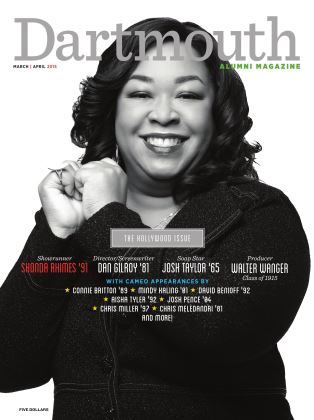The econ major is showing the largest news organization on the West Coast how to thrive in a digital world.
AUSTIN BEUTNER ’82
MAHMUD JOHNSON ’13
CYNDE MCINNIS ’94
DAVID BRION DAVIS ’50
KATHERINE CESPEDES ’10
JOSEPH MARCHESO ’96
“IT’S LIKE TRYING TO DO A RUBIK’S Cube in the dark,” says Beutner of the challenges of his new job as publisher and CEO of the Los Angeles Times. “The guiding principle in my career, however, is to put myself in uncomfortable positions and take risks.”
With a polymath’s verve, Beutner has cycled through a number of dispa- rate careers: In the late 1980s he was the youngest partner at the N.Y.C.-based pri- vate equity firm Blackstone Group. In the mid-1990s President Bill Clinton asked him to advise Russia on transitioning to a free-market economy. (During his three years in Moscow, Beutner met with both Yeltsin and Putin.) Then he cofounded Evercore, an investment banking advisory firm, and moved to Los Angeles in 2000.
In 2007 Beutner was mountain biking near his house with friend Jake Winebaum ’81. Coming down a hill, Beutner flew off his bike and suffered a concussion and a broken neck, requiring him to be airlifted to the hospital. During the months of recovery, he spent more time with his
wife and four kids. “While lying on my back recuperating I decided I wanted to make a difference through my daily ef- forts, not just through philanthropy. The accident allowed me to go beyond service at the policy level.”
Los Angeles Mayor Antonio Villaraigosa appointed him deputy mayor in charge of economic development—or “jobs czar”—overseeing a dozen city departments, including the L.A. Department of Water and Power, the nation’s largest municipal utility. Beutner even briefly considered a run for mayor of Los Angeles.
His current focus is the Times. After he made an un- successful bid to buy the paper, which was on the block as owner Tribune Co. struggled to emerge from bankruptcy in 2012, Beutner was approached by Tribune to become publisher instead. “My initial reaction was, ‘No, thanks’—I hadn’t had a boss in 20 years,” he says. “But then I thought this would be fantastic for our civic life if we could find a way for the L.A. Times to survive.”
He took on the job in August 2014 and already has made some major changes: student journalists are cover- ing 41 high schools on a new L.A. Times website, a weekly e-newsletter is about to go daily, digital tools are now in every reporter’s pocket and the iconic “California” section, cut in 2009, is back. “We have 500 journalists on staff,” he says. “The L.A. Times is the largest news organization west of the Hudson. We have an enormous audience. We have 4 million readers on Sundays. This is also an engaged audience—90 percent of our subscribers voted in the 2012 general election. One interesting dynamic in the digital age is that our readers come to us through search and through social. It is word-of-mouth, these little neighborhoods like in the past, only now they are digital.”
The L.A. Times has one of the few test kitchens left at any newspaper in the country, and in this new digital environment Beutner believes the paper can leverage the current fascination with food into real advertising dollars. The same goes for other niche coverage areas—such as the state of California, the Pacific Rim and the entertainment industry—where the paper holds a natural edge.
Facing challenges seems to be a hard-wired norm for Beutner. Since his accident he has continued to exercise daily at dawn: He runs, surfs, and paddleboards. He even rides his mountain bike down the same trail where he crashed.
<<<< The former L.A. jobs czar believes the 133-year-old paper is the civic conscience for the region.
“The story begins here. It starts with the L.A. Times and then it spreads to radio, television, the web,” says the new publisher.
james zug is the author of six books, including American Traveler: The Life & Adventures of John Ledyard. He lives in Wilmington, Delaware.
 View Full Issue
View Full Issue
More From This Issue
-
 Feature
FeatureBehind the Scenes
March | April 2015 By LISA FURLONG -
 COVER STORY
COVER STORYTelevision’s Wonder Woman
March | April 2015 By Jennifer Wulff ’96 -
 Feature
FeatureDrama King
March | April 2015 By TY BURR ’80 -
 FEATURE
FEATUREDirector’s Cut
March | April 2015 By PAMELA MASON WAGNER ’81 -
 Feature
Featureclassnotes
March | April 2015 By DARTMOUTH COLLEGE LIBRARY -
 Article
ArticleJosh (Tim) Taylor ’65
March | April 2015 By LISA FURLONG
JAMES ZUG ’91
-
 Alumni Opinion
Alumni OpinionIn Praise of Class Notes
May/June 2004 By James Zug ’91 -
 TRIBUTE
TRIBUTENo Quieter Bed
Sept/Oct 2005 By James Zug ’91 -
 Cover Story
Cover StoryThe Slaves of Dartmouth
Jan/Feb 2007 By JAMES ZUG ’91 -
 Cover Story
Cover StoryThe Italicized Life of Frank B. Wilderson III ’78
Sept/Oct 2010 By JAMES ZUG ’91 -
 Feature
FeatureSea of Dreams
July | August 2014 By JAMES ZUG ’91 -
 notebook
notebookLionheart
MARCH|APRIL 2019 By JAMES ZUG ’91








